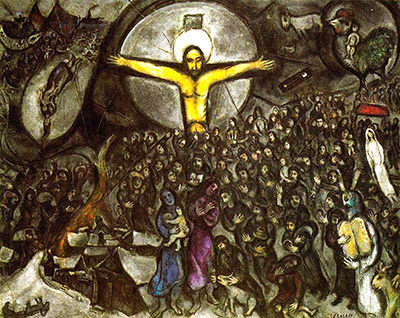Torah: Shemot 38:21 – 40:38; Haftarah Shabbat Chazak: 1 Kings 7:51 — 8:21
YESHUA — OUR KAPPARAH, OUR COVERING
Pekudei consists of the last chapters of Shemot and it starts with the reckoning of all the amounts of gold, silver and copper that were contributed for the construction of the Mishkan. This is not only to emphasize the generosity of the people but also to attest that all was used for the construction of the Mishkan and that Moshe and Betzalel were beyond reproach in handling the donations by keeping a detailed account of everything given.
After a detailed description of everything made, the Mishkan was ready to be erected and consecrated. Shemot 40:17, 34: “And it came to pass in the first month in the second year (Aviv), on the first day of the month, that the tabernacle was erected… Then a cloud covered the Tent of Meeting, and the glory of the LORD filled the Mishkan.” Shemot ends with the Shechinah – the Glory of the LORD — filling the Mishkan on the anniversary of the exodus from Egypt. The nation of Yisrael has been established and it will be guided from now on - spiritually and physically - by the glory of God. The purpose of the exodus from Egypt has been fulfilled and the people are ready to start a new year as a free nation. Tradition tells that Moshe, overwhelmed by the site of the Mishkan, composed a prayer praising God and asking for His blessing upon everything they did – the work of their hands. It is recorded as Psalm 90:
“A Prayer of Moshe the man of God.
‘LORD, You have been our dwelling place in all generations.
Before the mountains were brought forth, before You had formed the earth and the world, from everlasting to everlasting, You are God.
You turn man back to dust; and say, “Repent, O children of men!”
For a thousand years in Your eyes are but like yesterday when it is past, and like a watch in the night.
You sweep them away; they are like sleepers; they are like short lived grass in the morning.
In the morning it flourishes, and fades; by evening it is withered and dry.
For we are consumed by Your anger, and by Your wrath are we terrified.
You have set our iniquities before You, our secret sins in the light of Your countenance.
For all our days pass away in Your wrath; we spend our years like a fleeting thought.
The days of our years are seventy; or if, because of strength, they are eighty years, yet their pride is but trouble and wretchedness; for it is soon cut off, and we fly away.
Who knows the power of Your anger? According to Your fear, so is Your wrath.
So teach us to number our days, that we may get a heart of wisdom.
Return, O LORD! How long? And relent concerning Your servants.
O satisfy us in the morning with Your loving kindness; that we may rejoice and be glad all our days.
Make us glad as many days as You have afflicted us, and as many years as we have seen evil.
Let Your work be visible to Your servants, and Your glory to their children.
And let the beauty of the Lord our God be upon us; and establish the work of our hands upon us; O prosper it, the work of our hands.’”
God, indeed, blessed the work of their hands. But as great as the Mishkan must have been it was a mere copy of the things from above for we read in Hebrews 9:21-28: "Moshe sprinkled both the Mishkan and also all the vessels of service in the Mishkan with blood. Indeed, according to the Torah, almost everything is purified by blood, and without a kapparah by means of the shedding of blood there is no forgiveness. Therefore, it was necessary for the copy of the things in Shomayim be purified with these, but the things of Shomayim themselves with better sacrifices than these. For Moshiach did not enter into a Kodesh haKodashim made by human hands, a mere copy of the true Kodesh haKodashim, but Moshiach entered into Shomayim itself, now to appear before the face of the LORD for us. Nor was it so that He may offer Himself again and again, as the Kohen Gadol enters the Kodesh haKodashim yearly with blood not his own; for then it would have been necessary for Him to suffer often from the foundation of the world; but now, He has appeared to put away sins by the korban of Himself. So He, having been offered up once in order that He bore away the sin of many and shall appear a second time for salvation without reference to sin for those who expectantly await His arrival."
The Mishkan that Moshe built was a mere copy of the one in heaven. The earthly Mishkan had to be cleansed year after year with the blood sacrifice of an animal. So, too, the heavenly Mishkan had to be cleansed, but, as the apostle writes, it was cleaned not with the blood of a bull but with a better sacrifice, the sacrifice of Messiah, and, because of this better sacrifice, it had to be done only once.
The earthly Mishkan, with all its glory, was torn down in order for mankind to worship the Creator and not the things made by human hands. But through the Ruach haKodesh we are able to see the real meaning of the Mishkan, the representation of the Salvation offered to us by the Lord. Through Ruach haKodesh we are able to look at the copy and understand the necessity of the sacrifice of Yeshua for our salvation, to cover our sins without which we cannot come in the presence of a Holy God. And, through Ruach haKodesh, we expectantly await for Yeshua’s return to be able to see the heavenly Mishkan, a glory that the mind of man cannot comprehend.
It is customary in a traditional synagogue at the conclusion of the reading of a book, for the congregates to stand and chant: “Chazak! Chazak! Venischazeik! – Be strong! Be strong! And may we be strengthened!"
Shabbat Shalom.



